According to a recent Geres study, rural Myanmar is enthusiastically adopting electric cooking
With a view to facilitating access to reliable, sustainable, affordable energy services for everyone, as well as combating excessive use of charcoal for domestic cooking, Geres carried out six months’ research with 50 households which had recently begun to cook with electricity. Feedback.
This is a pilot study carried out by Geres as part of the Electric Cooking Outreach (ECO) programme financed by the MECS (Modern Energy Cooking Services) programme.
Background. Did you know? There is a dry zone in central Myanmar, where access to electricity is limited and sometimes non-existent. This zone is home to 30% of Burmese households and 80% of these use traditional wood-burning stoves for cooking.
The problem: these cooking practices are not only a significant cause of atmospheric pollution, but also exert heavy pressure on forest resources and give rise to serious domestic pollution and health risks, especially for women (still far too often consigned to the kitchen).
Further reading: Geres final report
See also: Women’s entrepreneurship, a source of energy in rural Myanmar
According to the cooking log filled in by 50 households over six months, electric cooking appliances have quickly become part of their daily lives
This pilot study, conducted by Geres in 2021, focused on 50 village households recently connected to the grid in the Burmese region of Thazi. The results show that adoption of electric cooking appliances – such as rice cookers, kettles and frying pans (figure 2 in the diagram below) – was rapid, significant and maintained on a day-to-day basis.
As the households each kept a cooking log, the study was able to answer the following questions:
- Are electric cooking appliances suited to the local culinary culture and electricity supply in Myanmar?
- Are households ready to use these appliances and pay to access electric cooking in the long term?
- What impact does adopting electric cooking have on their daily lives and especially on the women who mainly use the appliances?
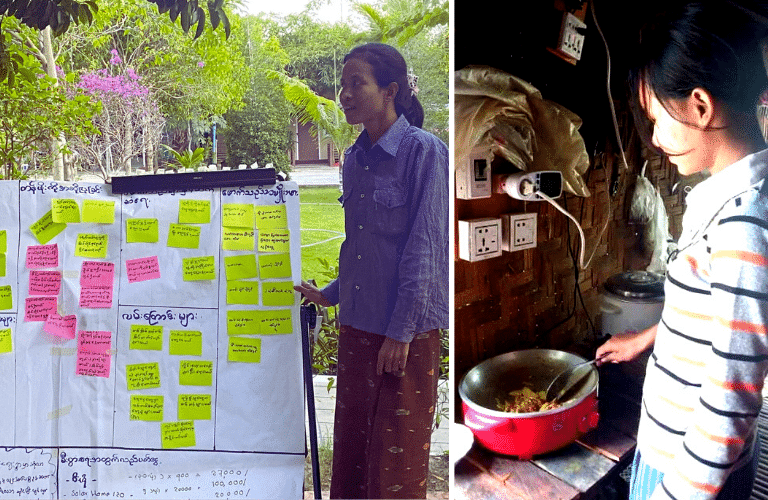
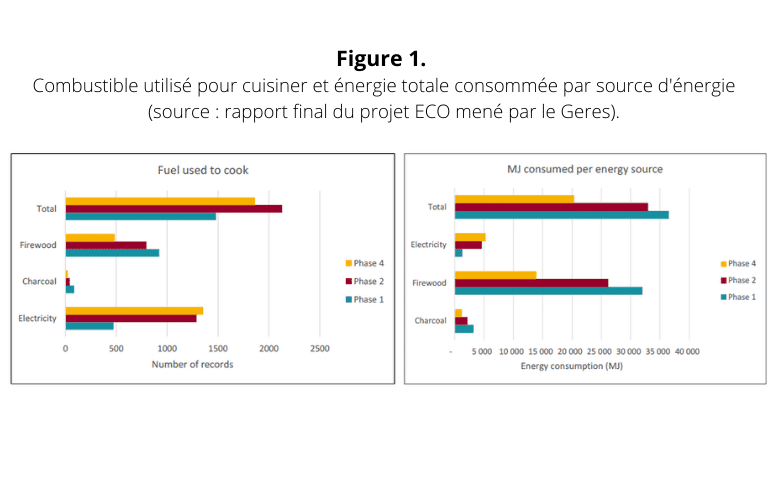
It can be seen that the introduction of electric cooking appliances (= “eCooking”) during phase 2, i.e. the second month, resulted in twice as much use of electric cooking as in the baseline phase (the 1st month).
According to figure 1 in the diagram, people chose to cook with electricity throughout the six-month pilot project. For example, during phase 4 (6th month of the study), use of electrical appliances increased further, accounting for almost two thirds of cooking activities.
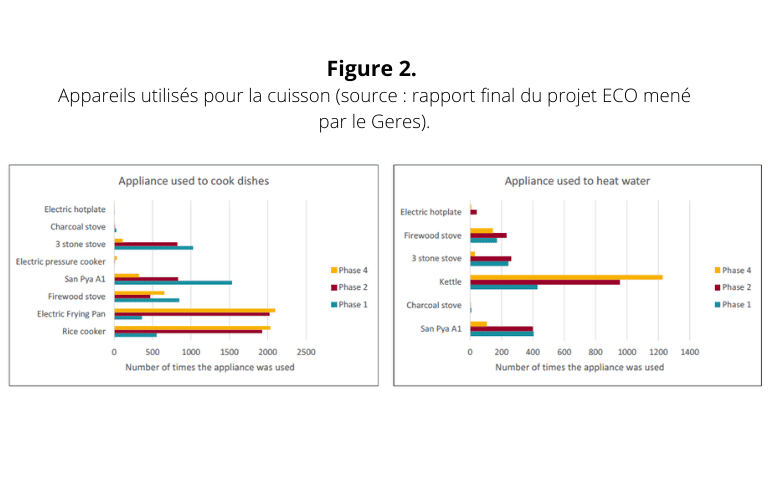
– 50%: the percentage reduction in use of firewood for cooking compared with the baseline situation. Use of charcoal almost disappeared over the same period.
The effect on rice cooking is especially noteworthy. It appears that electric rice cookers are used in 80% of cases, as against less than 30% during the baseline phase.
The study also shows that electric cooking is compatible with local culinary practices. In what way? There is no sign of households changing what they eat.
La cuisson électrique : un gain de temps conséquent, en particulier pour les femmes
Through the pages of the cooking log, households underline to what extent electric cooking is found to be easier, cleaner, less expensive and, above all, more practical.
Furthermore, people say that adopting electric cooking results in a substantial time saving. They are right: according to figure 3 below, the average time spent on cooking every day has gone down by more than 30 minutes.
These benefits are particularly important for women. Myanmar is still a very patriarchal society. Unfortunately, women are still primarily responsible for cooking and, on top of that, disproportionately affected by the pollution of indoor air, health problems and daily chores associated with the use of firewood or charcoal for cooking.
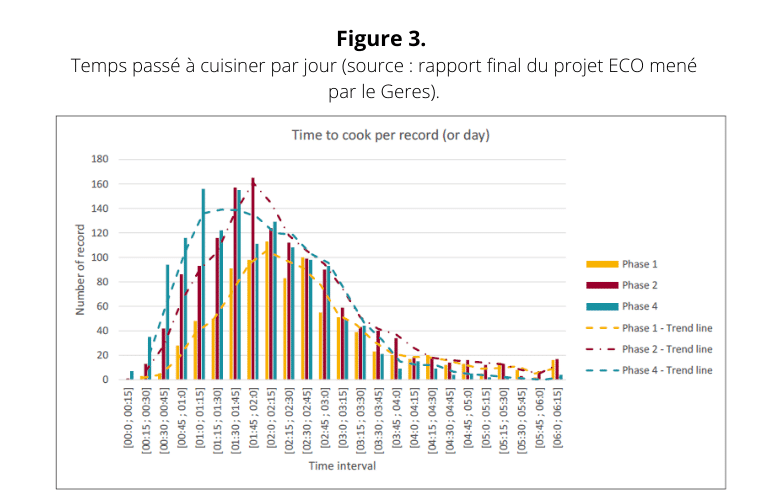
A lack of access to electric cooking appliances hinders their adoption in rural villages
While households are obviously keen to move to electric cooking, the lack of access (i.e. the initial cost and last mile availability) to good quality electric cooking appliances proves to be the main obstacle to their adoption in rural areas.
Another drawback: limited access to information. For example, 50% of study participants think that electricity is a more dangerous energy source than other cooking fuels. That preconceived idea is largely explained by users’ lack of information, an issue on which Geres is actively working.
Developing a network of women entrepreneurs to give women more financial independence and make these solutions more widely known in rural areas
To take up the challenge, the social enterprise currently being incubated by Geres[1], Ah Lin Tan (which means “Radiance” in Burmese), is supporting and training a network of last mile women entrepreneurs to market a selection of economical, high-quality electric cooking appliances.
This approach is part of Geres sustainable access to rural energy project. Objective: to foster the independence of Burmese women by promoting entrepreneurship (the women are trained to sell sustainable solar equipment and kits in the villages), as well as to facilitate access for all to reliable, sustainable and affordable energy services.
The drawback is that local suppliers of household appliances are also presently affected by supply chain problems. This implies a need for scaling up, particularly in order to improve logistical flows, for women entrepreneurs to be trained and for them to raise users’ awareness in order to develop sales.
Operating these three levers would make it easier to purchase goods in greater quantities at lower prices and/or import goods, so that Ah Lin Tan would then be less dependent on local suppliers.
[1] Project financed by AFD, Eurofins, the City of Paris and the Synergie Solaire Foundation
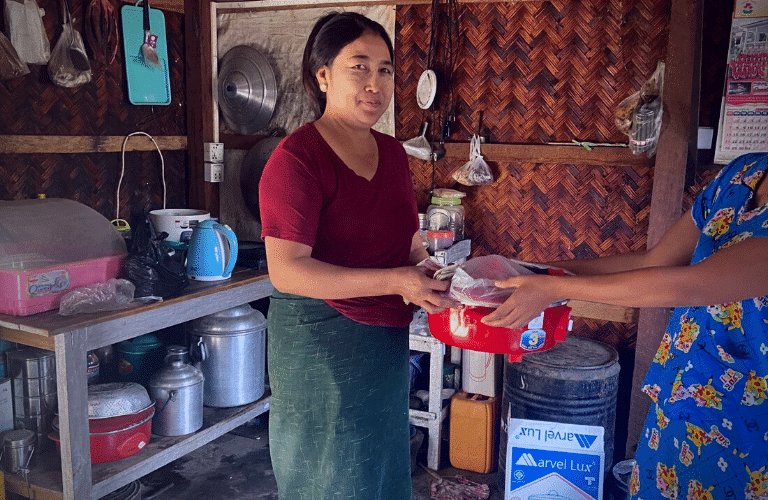
The after-sales repair service: genuine added value for the network of women entrepreneurs
According to the study, women entrepreneurs have a key opportunity to raise their profile by improving the after-sales service for electrical goods.
At the moment, repair and maintenance are complicated in rural areas because, without a certain level of sales, it is impossible to cover the logistical costs involved in returning relatively cheap products to suppliers.
As they are based locally, the women entrepreneurs trained by Ah Lin Tan can help to mitigate this problem by doing repairs locally or giving advice on diagnosing defective appliances.
Next stages: demonstrate the positive results of the study to convince investors of the opportunities presented by the adoption of electric cooking in Myanmar
By showing that there is a steady demand for electric cooking, even in rural areas, the pilot study has built up a really critical database enabling the MECS (Modern Energy Cooking Services) programme and Geres to make policymakers and investors aware of the obvious potential for development of the electrical sector in Myanmar.
For more information on the study, Geres final report is available.
DOWNLOAD DOCUMENTS
VOUS SOUHAITEZ AGIR EN FAVEUR DE LA SOLIDARITÉ
CLIMATIQUE ET SOUTENIR NOS ACTIONS ?
Dites-nous qui vous êtes et découvrez vos moyens d’action
CITOYEN·NE·S
Parce que la Solidarité climatique est l’affaire de toutes et tous, le Geres vous donne les clés pour passer à l’action.
ENTREPRISES
En tant que dirigeant·e d’entreprise, employé·e ou client·e responsable, vous avez le pouvoir d’agir au quotidien.
INSTITUTIONS & COLLECTIVITÉS
Soutenez nos actions en France et à l’international et devenez un acteur de la Solidarité climatique.
FONDATIONS
En vous engageant aux côtés du Geres, vous contribuez à la mise en œuvre d’actions innovantes et concrètes.
